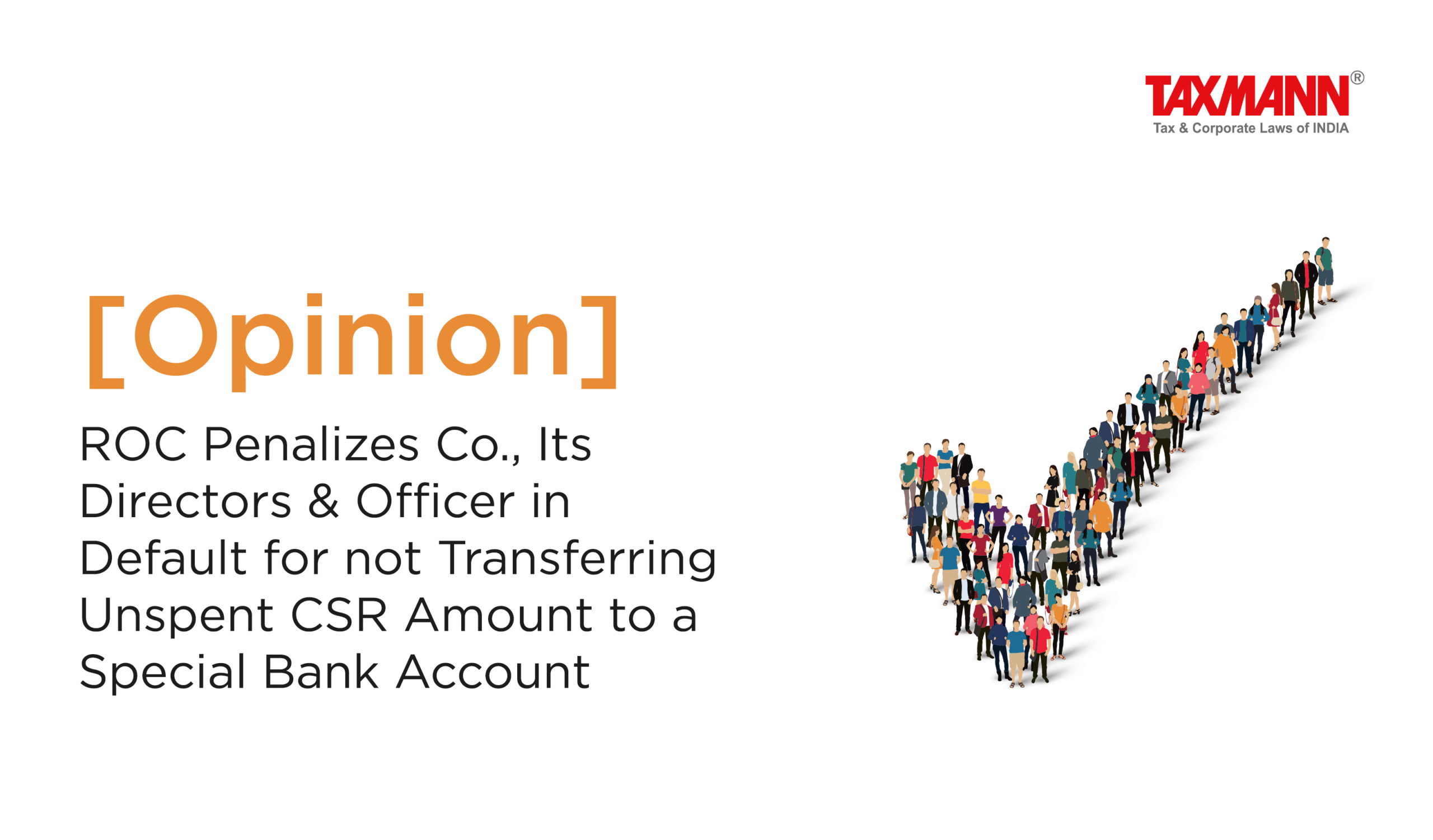[Opinion] ROC Penalizes Co., Its Directors & Officer in Default for not Transferring Unspent CSR Amount to a Special Bank Account
- Blog|News|Company Law|
- 2 Min Read
- By Taxmann
- |
- Last Updated on 19 September, 2023

Prof R Balakrishnan – [2023] 154 taxmann.com 323 (Article)
1. Corporate Social Responsibility
Effective from the 1st of April 2014, our country became the first one in the world to legally mandate corporate social responsibility. The rules in section 135 of the Companies Act 2013 make it mandatory for companies of a certain turnover and profitability to spend 2% of their average net profit for the past three years on corporate social responsibility activities.
2. Unspent CSR amount an ongoing project at the end of the financial year
Under the provisions of corporate social responsibility rules, amounts remaining unspent in a financial year relating to an ongoing project as well as any unutilised surplus arising from the CSR activities are required to be deposited by the company in a special bank account called the ‘Unspent Corporate Social Responsibility Account’. The transfer of the amount is required to be done by the company within a period of thirty days from the end of the financial year to the special account to be opened by the company in that behalf for that financial year in any scheduled bank to be called the unspent Corporate Social Responsibility Account.
3. Provisions under the Companies Act 2013 relating to this case
Provisions of sub-section (6) of section 135 of the Companies Act,2013 state any amount remaining unspent under sub-section (5), pursuant to any ongoing project, fulfilling such conditions as may be prescribed, undertaken by a company in pursuance of its Corporate Social Responsibility Policy, shall be transferred by the company within a period of thirty days from the end of the financial year to a special account to be opened by the company in that behalf for that financial year in any scheduled bank to be called the Unspent Corporate Social Responsibility Account, and such amount shall be spent by the company in pursuance of its obligation towards the Corporate Social Responsibility Policy within a period of three financial years from the date of such transfer, failing which, the company shall transfer the same to a Fund specified in Schedule VII, within a period of thirty days from the date of completion of the third financial year.
4. Penal action for non-compliance/default if any
Sub-section (7) of section 135 of the Companies Act 2013 is the relevant provision which spells out the penalty for any default under this section. Sub-section (7) of section 135 states that if a company is in default in complying with the provisions of sub-section (5) of sub-section (6), the company shall be liable to a penalty of twice the amount required to be transferred by the company to the fund specified in Schedule VII or the unspent Corporate Social Responsibility Account, as the case may be, or one crore rupees, whichever is less, and every officer of the company who is in default shall be liable to a penalty of one-tenth of the amount required to be transferred by the company to such fund specified in the Schedule VII, or the unspent Corporate Social Responsibility Account, as the case may be, or to two lakh rupees, whichever is less.
Click Here To Read The Full Article
Disclaimer: The content/information published on the website is only for general information of the user and shall not be construed as legal advice. While the Taxmann has exercised reasonable efforts to ensure the veracity of information/content published, Taxmann shall be under no liability in any manner whatsoever for incorrect information, if any.

Taxmann Publications has a dedicated in-house Research & Editorial Team. This team consists of a team of Chartered Accountants, Company Secretaries, and Lawyers. This team works under the guidance and supervision of editor-in-chief Mr Rakesh Bhargava.
The Research and Editorial Team is responsible for developing reliable and accurate content for the readers. The team follows the six-sigma approach to achieve the benchmark of zero error in its publications and research platforms. The team ensures that the following publication guidelines are thoroughly followed while developing the content:
- The statutory material is obtained only from the authorized and reliable sources
- All the latest developments in the judicial and legislative fields are covered
- Prepare the analytical write-ups on current, controversial, and important issues to help the readers to understand the concept and its implications
- Every content published by Taxmann is complete, accurate and lucid
- All evidence-based statements are supported with proper reference to Section, Circular No., Notification No. or citations
- The golden rules of grammar, style and consistency are thoroughly followed
- Font and size that’s easy to read and remain consistent across all imprint and digital publications are applied



 CA | CS | CMA
CA | CS | CMA
